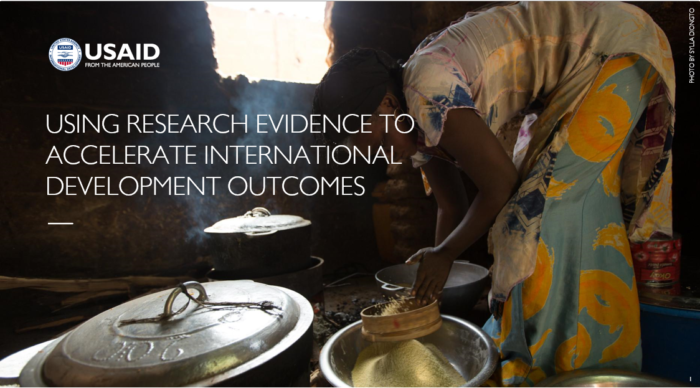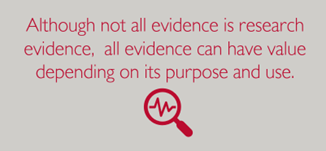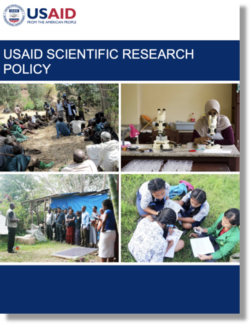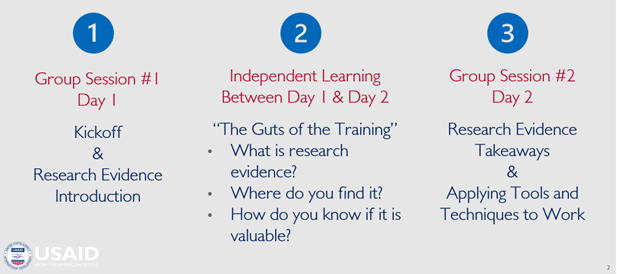Using Research Evidence to Advance International Development Outcomes
POSTED May 4, 2022
|Education
Among the Research Technical Assistance Center’s (RTAC) core competencies is supporting the U.S. Agency for International Development (USAID) in building capacity among its personnel. As part of its activities, RTAC designed, adapted, and implemented a series of in-person and virtual training courses on “Using Research Evidence to Advance International Development Outcomes.” The course and associated materials were developed in an intensive and collaborative manner with USAID staff from USAID’s Bureau for Development Democracy, and Innovation (DDI) and the Innovation, Technology, and Research (ITR) Hub, formerly the Global Development Lab.
 Using a Train the Trainers approach, RTAC designed the training to be adaptable so as to enable USAID to tailor the training to targeted groups of personnel across different technical operating units who have differing levels of familiarity with using research evidence to guide programming decisions. Furthermore, the training was designed to allow ITR to co-host trainings for other Bureaus and Independent Offices, such as the Center for Democracy Human Rights and Governance and DDI’s Environment, Energy, and Infrastructure’s Biodiversity Division.
Using a Train the Trainers approach, RTAC designed the training to be adaptable so as to enable USAID to tailor the training to targeted groups of personnel across different technical operating units who have differing levels of familiarity with using research evidence to guide programming decisions. Furthermore, the training was designed to allow ITR to co-host trainings for other Bureaus and Independent Offices, such as the Center for Democracy Human Rights and Governance and DDI’s Environment, Energy, and Infrastructure’s Biodiversity Division.
Responding to Agency Needs
The series of trainings has proven to be valuable to both a research-savvy and research-shy cadre of USAID personnel and has contributed to helping foster the ‘research mindset’ USAID envisioned in 2018RTAC Project Director Sutherland Miller III
The genesis of the training began in 2018 with an anonymous Agency-wide survey administered jointly by the then Global Development Lab and Office of the Chief Information Officer. Along with an accompanying analysis of training opportunities within the U.S. Government (USG), the survey provided an opportunity for RTAC to develop a course tackling the challenge of using research evidence to inform international development programming. The survey revealed a desire within USAID to increase the use of research in program design and implementation while furthering to hone the skills needed to do so. As one respondent noted, “Research can inform a sound theory of change (which flows down into targeting, activity design, [and] implementation approach) and increase the likelihood of achieving sustainable development outcomes.” Another noted, “[Appling research evidence to development programming] helps to improve programs by avoiding repeating interventions that do not result in the desired outcomes. Also it makes programs more efficient in delivering services to the right target populations.”

Another respondent noted that some colleagues “don’t seem to understand the linkage between research and ‘real world’ problems/project design, so they often think/treat research/data as something theoretical and therefore not relevant to actual work.” In reaction to survey responses, RTAC designed the training to directly address the major barriers to integrating research into program design and implementation as well as to help to develop a “research mindset” more broadly throughout USAID. For example, one survey respondent suggested that “Only the technical offices have time and expertise to conduct research. “As a program officer I depend on them to have done their research and for the sectoral research on problems to be complemented by the latest in behavioral economics, political economy analysis, and stakeholder analysis to have an idea of the solutions that are likely to work.”
The Training Journey: From Classroom Pilot to Virtual Outreach

In alignment with USAID’s Scientific Research Policy, RTAC and USAID developed an interactive pilot workshop curriculum to address barriers uncovered in the survey and take advantage of the opportunities presented by furthering USAID staff’s understanding and use of research. The training focused on sharing common experiences among the trainees, group exercises, practicing specific tools and techniques, and highlighting relevant resources within USAID and beyond. Prior to the COVID-19 pandemic three in-person pilot training courses were conducted in 2019 – two led by RTAC in May and December and one led by USAID itself in November – for a diverse group of around 75 USAID personnel from field missions and Washington-based Missions, Bureaus, and Independent Offices.
Over time, RTAC adapted the training modules based on the experience and event evaluations of the three pilot courses. Originally segmented into three modules, the second phase of the training was condensed to reduce the focus on communicating evidence in favor of a more intense exploration of the use of evidence and data in decision-making, understanding what “research evidence” is, evaluating the relative value of research evidence in the USAID and USG context, and how to use various sources of research evidence within USAID

Over 2020 and 2021, RTAC conducted a training-of-trainers session, two virtual training courses, and a series of corresponding technical and content rehearsals for the virtual component of the training on using research evidence to advance international development outcomes. USAID staff also conducted their own modified training in early 2022 based on the training and materials developed under RTAC. The virtual sessions engaged more than 90 individuals from across USAID’s missions and Washington, DC-based operating units to deepen the skills and knowledge base related to integrating research evidence into program design, monitoring, evaluation, and adaption.
As RTAC Project Director Sutherland Miller III notes, “The series of trainings has proven to be valuable to both a research-savvy and research-shy cadre of USAID personnel and has contributed to helping foster the ‘research mindset’ USAID envisioned in 2018. Furthermore, in partnership with our colleagues at USAID, we have demonstrated that we can develop a robust yet adaptable training experience that interested USAID staff can replicate in a sustainable manner as the need arises.”
